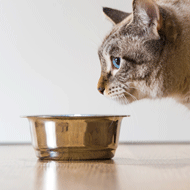Cat TB cases could be linked to raw pet food

Investigations found the only common factor among the patients was that they had all eaten Natural Instinct’s Wild Venison cat food.
A spate of TB cases in indoor cats could be linked to raw pet food, scientists have said.
Around 13 UK cats are thought to have been affected so far. The issue was first identified when six cats were taken to separate veterinary practices across England, showing clinical signs of TB.
Testing confirmed the patients were infected with Mycobacterium bovis. A further seven cats that were living in the same households were also found to be infected, but were not showing clinical signs.
All of the affected cats were indoor-only and had no contact with any wildlife that could have passed on the disease. Vets at the Royal (Dick) School of Veterinary Studies found that the only common factor among the patients was that they had all eaten Natural Instinct’s Wild Venison cat food.
The research team did not test the food so they cannot confirm it was the source of the infection, however Natural Instinct voluntarily recalled the product in December last year. It advises anyone who still has a stock of the product to return it for a full refund.
Professor Danièlle Gunn-Moore commented: “We found circumstantial evidence that these cases of TB in cats were linked to a particular brand of raw food diet. Not all animals that are infected with the bacteria will develop disease but we would encourage owners with concerns about their pets to get them checked by their local vet.”
While there have been rare cases of TB being passed from cats to people, experts said the risk is very low.
A spokesperson from Natural Instinct said: “Everything we do at Natural Instinct is done so with the best interests of our customers and their pets in mind. We can assure our customers that Natural Instinct followed, and continues to follow, every food standard, hygiene regulation and best practice required to produce raw pet food in the commercial market place.
“As a responsible manufacturer, we are regularly inspected by the Animal and Plant Health Authority (APHA). We have complied with all of the necessary requirements, and consequently APHA have confirmed they are satisfied all standards have been met by us.
While the company no longer manufactures and sells the Wild Venison product, it continues to work with the Food Standards Agency as part of the ongoing investigations.
A report on the first six TB cases in cats has been published in the Journal of Feline Medicine and Surgery.



 The Veterinary Medicines Directorate (VMD) is inviting applications from veterinary students to attend a one-week extramural studies (EMS) placement in July 2026.
The Veterinary Medicines Directorate (VMD) is inviting applications from veterinary students to attend a one-week extramural studies (EMS) placement in July 2026.